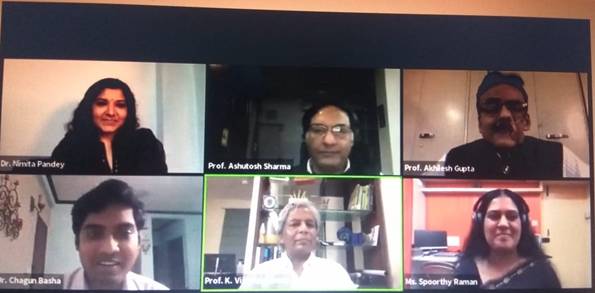Ministry of Science & Technology
Public & expert consultation ‘Town hall Meet’ for STIP 2020 launched
“India is one of the few postcolonial countries that have invested in the development of Science and Technology”: Professor K Vijay Raghavan
Prof Ashutosh Sharma: “The new policy should bring about seamless connection of all stakeholders by identifying weak links in the chain and weakness in connection of silos and correcting them. The future is all about convergence & integration of technologies”.
Posted On:
13 JUN 2020 2:04PM by PIB Delhi
STIP 2020 Town Hall Meet, the Track-I public & expert consultation process for the formulation of Science, Technology and Innovation Policy (STIP) 2020 was launched by the Principal Scientific Adviser to the Government of India Professor K VijayRaghavan and Secretary, DST Professor Ashutosh Sharma on June 12, 2020.
While inaugurating STIP 2020 Town Hall Meet, Prof K VijayRaghavan said that Covid 19 has shown us that it is critical to invest in science with missions focusing on critical areas like Change & Sustainability, Environment & Biodiversity and Information. “India is one of the few postcolonial countries that have invested in the development of Science and Technology,” he added.
He pointed out the necessity to make science and knowledge accessible freely for everybody across languages and other existing barriers. He said that the consequence of the policy should be to reach out to as many people as possible and for that translation of science is extremely important so that people can think independently in their own language and access knowledge and resources.
The Track I consultation process involves an extensive public and expert consultations through Science Policy Forum, a dedicated platform for soliciting inputs from larger public and expert pool, to make the formulation of STIP 2020 decentralized, bottom-up, and inclusive.
The engagements in Track I will include public dialogue series with thought leaders & policy scholars, a thematic panel discussion with public engagement, targeted survey instruments, print media articles and channels for written inputs, community podcasts for last-mile connectivity.
At the inaugural session Prof Ashutosh Sharma mentioned that the new policy should bring about seamless connection of all stakeholders by identifying weak links in the chain and weakness in connection of silos and correcting them. He said the future is all about convergence & integration of technologies.
While giving a brief idea of the architecture of science policy and how this 2020 policy is special, he said that data, measurement wisdom, knowledge should come together for pole vaulting forward to bring change in science in several orders of magnitude. Prof Sharma said that the Atmanirbhar Bharat necessitated by the COVID19 should be globally competitive and this can be done only when the basic knowledge systems are connected.
The Head of STIP 2020 Secretariat & Adviser DST Dr. Akhilesh Gupta presented the Track I consultation process of #STIP2020 to make the policy evidence driven; wisdom based; thematic; inclusive & bottom-up, at the launch of the consultation.

The Office of the Principal Scientific Adviser to the Government of India (Office of PSA) and the Department of Science and Technology (DST) have started a consultative process for the formulation of a new National Science Technology and Innovation Policy (STIP 2020) reaching out to a wide range of stakeholders.
The STIP 2020 formulation process is organised into 4 highly interlinked tracks, which will reach out to a large number of stakeholders for consultation in the policy formulation. Track I involves an extensive public and expert consultation process through Science Policy Forum - a dedicated platform for soliciting inputs from larger public and expert pool during and after the policy drafting process. Track II comprises experts-driven thematic consultations to feed evidence-informed recommendations into the policy drafting process. Twenty-one (21) focused thematic groups have been constituted for this purpose. Track III involves consultations with Ministries and States, while Track IV constitutes apex level multi-stakeholder consultation.
The consultation processes on different tracks have already started and are running in parallel. The Track-II thematic group (TG) consultation started with a series of information sessions, and the Track-I was launched to collect inputs from experts as well as from public.
A Secretariat with in-house policy knowledge and data support unit, built with a cadre of DST-STI Policy fellows, has been set up at DST (Technology Bhavan) to coordinate the complete process.
*****
NB/KGS/(DST)
(Release ID: 1631342)
Visitor Counter : 1640